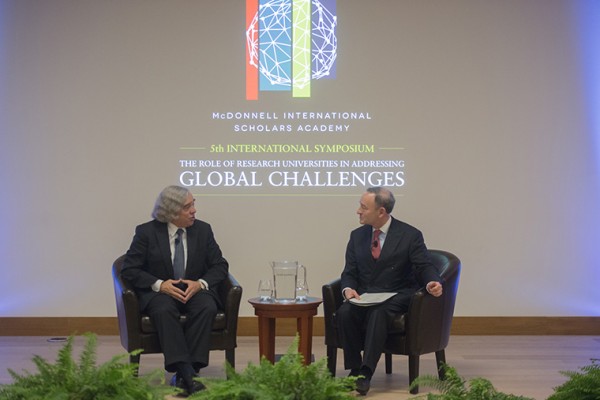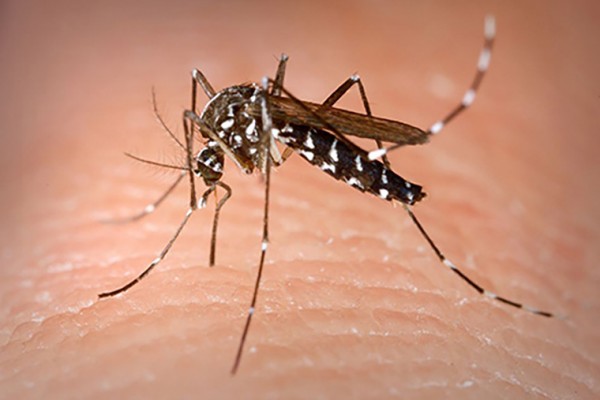Budding entrepreneurs: Apply now for Bear Cub grants
Washington University’s Bear Cub grant program helps researchers make the leap from bench scientists to budding entrepreneurs. The application deadline is Nov. 30.
Seven internationally famous specks of dust
This August, a consortium of 65 scientists announced in the journal Science that they have so far found seven probable but not confirmed interstellar dust specks in a collector returned to Earth by the Stardust spacecraft in 2006. Undergraduate students at Washington University in St. Louis found three of the seven specks of dust.
Himalayan Viagra fuels caterpillar fungus gold rush
Overwhelmed by speculators trying to cash-in on a prized medicinal fungus known as Himalayan Viagra, two isolated Tibetan communities have managed to do at the local level what world leaders often fail to do on a global scale — implement a successful system for the sustainable harvest of a precious natural resource, suggests new research from Washington University in St. Louis.
Addressing global challenges: The role of research universities
Representatives and leadership from Washington University and the 28 McDonnell International Scholars Academy institutions came together with policymakers, researchers, students and corporate partners for the recent Fifth International Symposium on “The Role of Research Universities in Addressing Global Challenges.” The symposium, sponsored by the McDonnell Academy, focused on how interdisciplinary research and education collaboration can lead to innovative solutions for the world’s most pressing problems
Hot on the trail of the Asian tiger mosquito
The Asian tiger mosquito (Aedes albopictus) was spotted in Houston in 1985 but can now be
found in all of the southern states and as far north as Maine. To reconstruct its spread, scientists turned to the new discipline of landscape genetics.
Correlating genetic patterns with landscape patterns, they concluded
that the mosquito had hitched a ride along highways. One of only a handful of landscape genetics studies to track an invasive species, this is the first to detect hitchhiking.
Walk through buildings from your own device
The School of Engineering’s Yasutaka Furukawa, PhD, combines 3-D computer vision of indoor scenes
with the capabilities of Google Maps and Google Earth to create a
unique, high-resolution, photorealistic mapping experience of indoor
spaces. Though he is starting with spaces like the New York museum The Frick Collection, he intends to bring his technology to St. Louis — specifically to
Washington University’s Danforth Campus.
The right to privacy in a big data world
In the digital age in which we live, monitoring,
security breaches and hacks of sensitive data are all too common. It has
been argued that privacy has no place in this big data environment and
anything we put online can and probably will be seen by prying eyes. In
a new paper, noted Washington University in St. Louis privacy law expert Neil M. Richards, JD, makes the
case that when properly understood, privacy rules will be an essential
and valuable part of our digital future.
World faces looming food and water challenges, say academic researchers
Climate change, water shortages and the loss of
farmland to pollution and urban sprawl are making it increasingly
difficult for farmers to feed the world’s growing population,
agricultural scholars from four continents said this week at an
international symposium held at Washington University in St. Louis.
Major Indo-U.S. Advanced Bioenergy Consortium launches
The government of India’s Department of Biotechnology,
Indian corporate leaders and Washington University in St. Louis have
invested $2.5 million to launch the Indo-U.S. Advanced Bioenergy
Consortium for Second Generation Biofuels (IUABC). The goal of the center is to increase biomass yield in
plants and algae, enabling downstream commercial development for
cost-effective, efficient and environmentally sustainable production of
advanced biofuels.
Black holes are topic of 2014 Robert M. Walker Distinguished Lecture
The topic of the 2014 Robert M. Walker Distinguished Lecture the evening of Oct. 23 will be black holes. The speaker is Ramesh Narayan, a Harvard astrophysicist who has studied the event horizon and the spin of these celestial enigmas. The talk, which starts at 7 p. m. in Whitaker Hall on the Danforth Campus, is free and open to the public.
Older Stories




